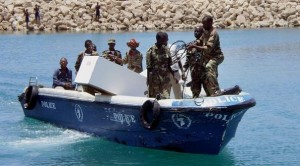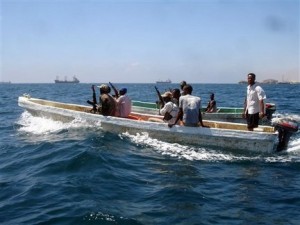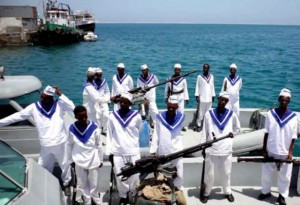Anglo-American Support for Somali Coast Guard, Strategic Pragmatism or Problem?
With the potential support of a privately-trained maritime force, are the US and UK manoeuvring towards a more pragmatic approach to the piracy problem in Somalia?
 On Tuesday 23 November the UN Security Council continued to condemn and deplore pirate actions off the coast of Somalia. UNSC Resolution 1950 re-authorises, commends and encourages state and regional organisation initiatives to counter piracy in accordance with continued cooperation with Somalia’s Transitional Federal Government. Interstate cooperation within the military sphere should continue to follow a similar path as shown by the recent collaboration between the Seychelles coast guard and EUNAVFOR in apprehending 16 pirates, but what of state cooperation with the private sector?
On Tuesday 23 November the UN Security Council continued to condemn and deplore pirate actions off the coast of Somalia. UNSC Resolution 1950 re-authorises, commends and encourages state and regional organisation initiatives to counter piracy in accordance with continued cooperation with Somalia’s Transitional Federal Government. Interstate cooperation within the military sphere should continue to follow a similar path as shown by the recent collaboration between the Seychelles coast guard and EUNAVFOR in apprehending 16 pirates, but what of state cooperation with the private sector?
According to a Telegraph (UK) investigation, it recently became apparent that the UK Foreign and Commonwealth Office were holding talks with security firms, notably Drum Cussac, in the endeavour of establishing a coastguard on behalf of Somalia’s Transitional Federal Government. The Telegraph article identifies that the funding for such an endeavour would be largely drawn from the $25 million the US promised to the antipiracy project whilst ‘indirectly’ stemming from the UK’s funding of other related national security projects.
This is far from the first private initiative to develop Somalian maritime security capabilities, but it is unique in the scale and source of external support and funding.
Funding is a critical concern, numerous previous private security bids and contracts have floundered with elusive revenue, and a lack of funding in a prior endeavour by Hart International allegedly ended up with trained and equipped Somali maritime security personnel turning to piracy and taking their skills and kit with them.
 Whilst some may place the blame directly at Hart’s doorstep, a more considered approach would indicate that this outcome primarily occurred due a lack of sustained funding and few to none of the necessary internal structures established within Somalia to sustain a maritime force . There were few incentives for the Puntland maritime forces to remain operational as opposed to the lucrative opportunities of piracy.
Whilst some may place the blame directly at Hart’s doorstep, a more considered approach would indicate that this outcome primarily occurred due a lack of sustained funding and few to none of the necessary internal structures established within Somalia to sustain a maritime force . There were few incentives for the Puntland maritime forces to remain operational as opposed to the lucrative opportunities of piracy.
Currently, with some Norwegian financial support, Nordic International has been working in Somaliland’s ports and Triton International has been attempting to establish its coastguard. There are also recent reports that Saracen International is undertaking a similar contract in Puntland.
If maritime security forces are being established in each of these areas there are considerable concerns over a duplication of efforts and the creation of parallel force structures within one internationally recognised state. The internationally recognised Somali government whose reach barely extends beyond the capital, shares an antagonistic relationship with a relatively stable Puntland and secessionist Somaliland, who in turn have their disputes with each other.
 These antagonistic relationships and multiple power structures are likely to impact upon the operations of their respective maritime forces. Puntland has already objected to the TFG using a commercial partner to establish a coastguard and the development of Somalia’s maritime forces have been delayed over disagreements over who should have control.
These antagonistic relationships and multiple power structures are likely to impact upon the operations of their respective maritime forces. Puntland has already objected to the TFG using a commercial partner to establish a coastguard and the development of Somalia’s maritime forces have been delayed over disagreements over who should have control.
It is not inconceivable that the recent release of the FCO’s discussions with Drum Cussac and that of Puntland accepting Saracen are potentially interrelated. It is certainly not the first time the private sector has assisted in the establishment of one armed group in support of an African government, only for it to become a destabilising force later on. Whilst those infamous episodes in the 1990s differ massively from this scenario, the concern remains that multiple maritime security structures in Somalia could, in the long run, have a negative impact on stability.
It remains plausible that the various Somalian maritime forces may not cooperate and as previously seen in East Asian waters; pirates simply retreat uninhibited to another region. Similarly, we may also see the TFG using its trained maritime forces to assert control over areas it has previously been unable to achieve on land.
Fortunately, with such a lack of control of their maritime peripheries, the threat of this occurring in the near future is currently minimal. Although ill-defined maritime borders may lead to problems, the greatest threat of parallel force structures creating instability is on land, where there are already thousands of TFG troops being trained, not at sea.
Perhaps in their ‘pragmatic’ outlook the US and UK deem the risks acceptable. Both the US and UK currently adhere to the concept of a unified Somalia and to that extent aiding the TFG in the maritime sphere would not necessarily equate to the development of a parallel force structure, but assist the legitimate Somalian government in tackling its pirate problem and in turn deal with a concern for them.
 The establishment of effective indigenous maritime forces with proper oversight and funding through the TFG is likely to reduce pirate activity, especially as the main ports that the pirates operate from lie outside of Somaliland and Puntland. Multiple Somalian maritime forces may lead to problems in the future, but in the country’s current situation there is little doubt that an increase of indigenous maritime control is a positive one. The potential for the reduction of pirate activity has a net international benefit.
The establishment of effective indigenous maritime forces with proper oversight and funding through the TFG is likely to reduce pirate activity, especially as the main ports that the pirates operate from lie outside of Somaliland and Puntland. Multiple Somalian maritime forces may lead to problems in the future, but in the country’s current situation there is little doubt that an increase of indigenous maritime control is a positive one. The potential for the reduction of pirate activity has a net international benefit.
As I discussed in a previous MSR article, there are significant drivers for change in the US’ attitudes in dealing with piracy. Perhaps this is a more overt indicator identifying a shift towards pragmatism in the US and UK’s counter-piracy strategies.


why should the usa have to share this wiith that country and what is your reason of supporting it
Hi Christina,
Thank you for your questions. Could you please elaborate on which country you are referring to? – My article refers to more than Somalia (which is the internationally recognised state), but also to Somaliland and Puntland. Could you also please explain what you mean by “this” ? Economic Aid? Diplomatic relations? Political support? Reconstructive support?
Without further clarification i can only speculate as to what your question is – Why should the USA be involved in Somalia at all? If you are a US citizen I think your Senator may be better placed to answer this question for you.
A comprehensive answer is not simple. The US has many interests in the region:
– maintaining maritime trade to and from the US – (Arguably a primary role and rationale for the existence of any Navy, not least for the most powerful navy on the planet)
– maintaining international trade which also impacts upon the US economy and power (the energy market is an obvious example).
– Lots of vested interests in countries in the region (Saudi Arabia, Kuwait, UAE, Iraq, Egypt, Kenya, Uganda to name a few – all affected by instability and piracy in Somalia.)
– Maintaining US global leadership. (The US is attempting to engage in Africa and the Middle East as the world leader that it is. Continuing to be the world leader has major responsibilities and a perception exists in the US that the US’ interests are global. For the US to continue as the global leader, it must act as so. It may seem paradoxical but the more power a state possesses, the more interests it has. The British and Roman Empires are simplistic examples to prove the point established by several International Relations scholars.)
– History. (The US’ historical involvement or lack thereof in Somalia during the Cold War and then over the 1990s has had lasting impact upon successive administrations in the White House. The US has attempted to ignore the problem in the past, but to some extent the problem has come to them now.)
– Modern proactive policies. (Added to these considerations is the current policy environment of proactive engagement rather than permitting a development of an problem into a more substantial one, there is a significant threat that Somalia will become a larger problem if left alone.)
– The effect of domestic opinion (American, and arguably international, attention was drawn to the Somali piracy problem with the capture of US citizens in 2008. Further events like pirate attacks on a US warship and the pirate trials in Virginia provide the US media and public with a fluctuating, but ongoing, concern with the piracy problem – one which the US government cannot simply ignore.)
But lets not kid ourselves here, if you look at the actual level of US engagement with the piracy/Somalia “failed-state” problem, threat to US interests are palpable, but are not considered to be high. If you looked at a list of US engagements and by extrapolation considered threats to US interests in the world (economically, politically and militarily), I would wager that Somalia would be outside of the top 10. You may think otherwise, please explain why if you do.
I hope that answers your questions.
If not, let me know and I’ll endeavour to better answer them for you.
Best,
Gary
Gary,
Full proposals for the creation, development and establishment of an incremental and fully coordinated Training, Operational Mentoring and an independent, but mutually supporting set of Coastguards or Coastal Monitoring Forces Development Plan, in line with the agreed Kampala Agreement and the requirements of the CGPCS was presented at the full Contact Group, to all the delegates, on two separate occasions by the Somaliland Government and Triton International Ltd. The programme proposed a series of phases to implement, train and mentor Coastguard development from Somaliland, through to Puntland, on to Galmudug and then down to Mogadishu.
It was also recommended that the programme could be conducted jointly, enabling coordinated training and cross personnel placement for the development of cooperation and peaceful continuity of working practices etc…
To date, this programme has been ignored and there is no indication that it will be addressed. It has already resulted in multiple companies training different forces, different skills and tactics, with no forethought about any cooperation or a coordinated approach to Intel, Comms and the continuity of evidence or prosecution process.
It is both frustrating and disappointing.